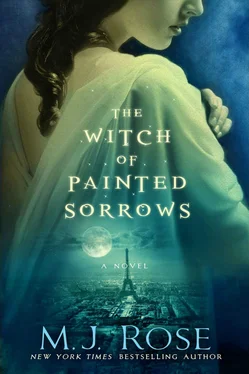It was only after a few moments that I noticed she was shaking.
“What is it?” I asked.
She shook her head. “My poor Philippe.”
Now I was not the one taking solace but giving it.
My life in my grandmother’s apartments on the rue de la Chaise took on a routine that was rather comforting in its sameness. We both needed to mourn before we could begin the process of healing, and we mourned together. Our days moved slowly and with less social interaction than was typical of life in Paris. Especially for a woman of my grandmother’s ilk.
In the mornings we would breakfast in our separate bedrooms on trays and then attend to our toilettes. At ten we met in the sitting room, where Grand-mère would write letters, go over the household matters with her housekeeper, receive the seamstress or the milliner, and make arrangements for upcoming assignations, dinners, and salons. Regardless of the recent tragedy, Grand-mère could not afford to ignore her business.
While she saw to running her household, I read the morning papers. At home, my father and I had read them together, stopping often to discuss this article or that. The world was still reeling from the 1893 financial crisis, and there were often items about failed banking institutions in the press. Indeed, at the end of my second week in Paris, there was an article about the Salome Bank of New York. Since it had ties to one of France’s greatest financial institutions, I shouldn’t have been surprised to see it, but it startled me nonetheless.
The Salome Bank of New York, I read, had merged with another institution and was now to be called the Salome and Tarcher Bank of New York.
So Benjamin had found the backing he’d gone to California to secure. Now he would have the funds he needed to replenish those he’d stolen to pay off his debts. Desperate, he’d left the day after my father’s funeral, and the lack of respect his haste showed astounded me. But the money markets never stop for any one man, Benjamin said, and his business was urgent. I’d argued until I realized his being gone would give me an opportunity to take a trip of my own.
It had not been a love match. Benjamin had been dashing and smart and was my father’s protégé. My father regarded him as a young man of substance. And I, who had somehow grown into womanhood eschewing the idea of romantic love, certain I would be better off avoiding it, was relieved to have the matter of my marital status over with.
Had my father not died, I could have accepted and stayed in a marriage without passion. But I could not remain with a brute who had my father’s blood on his hands.
The day after Benjamin left for San Francisco, I ran away in the opposite direction.
Most afternoons, after lunching together, Grand-mère and I would take a walk regardless of the temperature. She believed in braving the chilly air and moving briskly through the Luxembourg Gardens or the Tuileries or just walking by the Seine. Exercise, she told me, kept the body strong and the mind clear. Even rain didn’t keep us from our constitutional. On those days we took the carriage to the Louvre or Bon Marché, the extraordinary department store where Grand-mère was filling in my wardrobe. Not wanting to alert my household staff to the length of my planned stay, I’d taken only what I’d required for a short trip to Virginia. There were all kinds of clothes and accessories I needed that I didn’t have with me. After only two weeks, under my grandmother’s tutelage, I already looked more French than American.
Usually after our walk we’d stop at Angelina’s for hot chocolate if we were on the Rive Droite or at Café de Flore for coffee if we were on the Gauche. Often, as we sipped our beverages, Grand-mère reminisced about raising my father in a Paris that had changed so much since then. She talked easily with me about her past, even telling me about men she’d known and who had been in love with her. Listening to her and getting caught up in her stories, I understood where my father had gotten his tale-spinning talent.
The only subject that would make my grandmother grow quiet was when I tried to get her to talk about her beautiful house on rue des Saints-Pères. I dreamed about it almost every night . . . strange dreams that were dark and complicated. Visions of ghostlike women wandering through the halls, weeping. I wanted to tell my grandmother about them, but she was so uncomfortable when I raised the subject of the house. She’d always say the same thing—that old houses had many problems, and hers needed extensive renovations, so she’d shut it down to do the work.
Her rush to change the subject made me wonder why discussing the house unsettled her so, but she never gave me a clue.
On Tuesdays, Thursdays, and most Saturdays, our routine included a light supper together at seven, and then at eight I’d retire to my room when my grandmother’s business life began.
Her job required her to be coiffed, perfumed, and manicured, to dress in the height of fashion, to make her salons entertaining fantasy retreats serving up only the finest foods and wines, along with witty repartee and delightful music. All of this took time and effort. Visits with hairdressers, dressmakers, hatmakers, masseuses, and other purveyors took up hours every day. The salons usually commenced around nine and ended by one or two in the morning, but my grandmother prepared all week. Other nights we dined later, sometimes with a friend or two of hers and sometimes by ourselves.
During her soirees, I was glad to remain upstairs, away from the men, the music, and the noise, hiding in the pale yellow bedroom where I would try to read. I was finally making headway through The Picture of Dorian Gray , a book I’d brought from home and tried but failed to read on the ship. I’d been too disturbed. I wasn’t sure if it was the novel’s foreboding tone that mirrored my mood or the fact that this was the last book my father had read before his death. Once I fell under its spell, Mr. Wilde’s story absorbed me and, for a short time, allowed me to stop thinking about everything that had happened to me and worry instead about what was happening to his characters. The novel was a dark, disturbing tale that excited me and made me afraid at the same time.
My father had left annotations and marginalia in the pages that were not always welcome. Sometimes they made me feel closer to him; other times they caused me great sorrow, especially when I found something of particular interest and grasped anew, with a fresh stab of grief, that I couldn’t just get up and go find him so we could discuss what he’d written.
The Picture of Dorian Gray was reported to be salacious, but my father said he thought I’d like it because it proposed some fascinating theories about the power of art.
My father and I both loved art; he’d nurtured that love in me. I could get lost in a painting, become mesmerized by a fine piece of sculpture. Like him, beauty astounded me. Talent awed me. The magic of art—the transformative powers, the luscious hues, textures, patterns—it all absorbed me. I was fascinated by the way an artist took something he saw and then turned it into a personal statement. I loved seeing the world translated by these great poets of color and line.
When I was thirteen, wanting to please my father, I’d taken up painting in school. But I could never put down on canvas what I saw so clearly in my mind and was always frustrated. My teacher said that I had real talent and showed great promise but needed to learn to be more patient.
Читать дальше



![Лаура Бренз - Потомственная ведьма[Inherit the Witch]](/books/79609/laura-brenz-potomstvennaya-vedma-inherit-the-witch-thumb.webp)









